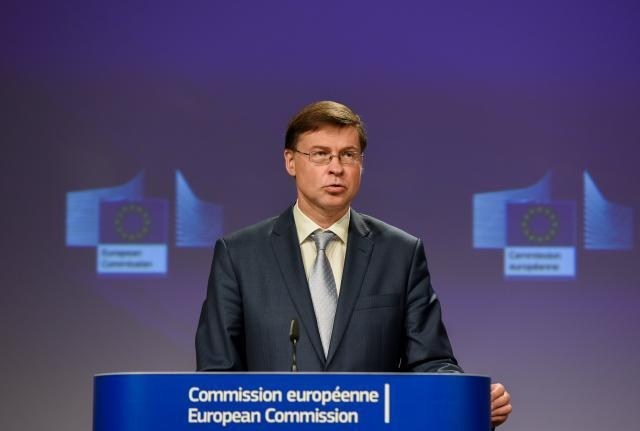The European Commission adopted last week a Communication on improving implementation of EU’s regulatory framework on anti-money laundering and countering the financing of terrorism. Some EU member states are more vulnerable to money laundering than others.
About 1 % of EUs annual GDP is “detected as being involved in suspect financial activity” according to figures from Europol, the EU law enforcement agency. The Commission considers therefore the fight against money laundering and terrorism financing an important priority for EU and part of delivering the Security Union.
"A credible framework for preventing and fighting money laundering and terrorist financing is essential to maintain the integrity of the European financial system and reduce risks to financial stability,” said Valdis Dombrovskis, Vice-President and Commissioner in charge of Financial Stability, Financial Services and Capital Markets Union, at a press briefing in Brussels (24 July).
Dombrovskis, a former prime minster of Latvia who has been reappointed as Commissioner by his home country, did not mention the on-going money laundering scandal in Latvia but stressed that “there is no place for it in European banks.”
The New York Times reported recently that Latvian officials have promised to crack down on “the corrupt banks that made the country one of the world’s pre-eminent money-laundering centers, especially for money flowing out of Russia. Otherwise it could wind up on a list of money-laundering centers.”
Such a designation would severely constrain Latvia’s access to the global financial system, meaning local businesses would have even more trouble conducting transactions with foreign partners and Latvians would no longer be able to use their credit cards abroad, writes the newspaper.
Scandinavian Banks, Danish bank Danske Bank and the Swedish bank Swedbank, have been involved in money-laundering schemes in Estonia and possibly also in the other Baltic countries that are vulnerable because of their closeness to Russia.
Asked by The Brussels Times about its on-going investigation of Swedbank, a spokesperson for the Swedish financial supervisory body (Finansinspektionen) said that the investigation is expected to be finalised by the end of 2019 but declined to disclose if it also involved Latvia. He referred any questions about the new Communication to the Swedish ministry of finance.
While Dombrovskis stressed that the EU has strengthened its legal framework on preventing money laundering and terrorist financing in recent years, he admitted that much more needs to be done.
EU member states still needs to fully implement the fourth Anti-Money Laundering Directive. Some of its shortcomings will be addressed in a forthcoming fifth directive which is due to be transposed by January 2020. Another directive on combating money-laundering by criminal law will be transposed by member states by December 2020.
The Communication refers to four reports on risks and supervision by national authorities. In its risk assessment report, the Commission identified 47 products and services as potentially vulnerable to money laundering or terrorism financing in the internal market, up from 40 in the 2017 report.
These 7 additional products and services are part of four new sectors that that were not assessed in the 2017 edition: privately-owned automated teller machines (ATMs); professional football; free ports; and investor citizenship and residence schemes (‘golden passports/visas').
The Commission also published a report on the assessment of alleged money laundering cases affecting EU banks 2012 – 2018, without disclosing their names. The analysis showed substantial incidents of failures by credit institutions to comply with core requirements of the Anti-Money Laundering Directive.
The findings in the reports are intended to inform the debate about how the framework for anti-money laundering and countering the financing of terrorism could be further improved and to provide the basis for discussions with relevant stakeholders.
How concerned is the Commission about what happened in Latvia which apparently has affected the whole bank system in the country?
A Commission spokesperson replied to The Brussels Times that the purpose of the case study report was to analyse the different money laundering cases that took place over the last years, including the ABLV bank in Latvia (one of the largest banks which has been liquidated).
“With the systemic approach across the EU, we identified that the enforcement was not sufficient and uneven, the coordination between the supervisors was still too slow and that the banks themselves hadn’t focused on these risks enough.“
How does the Commission explain that the current anti-money laundering framework - one of the strictest in the world – did not prevent it? Was is because of a lack of national supervision or inadequate EU rules?
“The reports show that we have already addressed a number of the weaknesses identified through these cases. A number of them took place before the 4th Anti-Money Laundering Directive that entered into force in June 2017. The 5th Anti-Money Laundering Directive – which enters into force in January 2020- already addresses the new areas of risks, such as virtual currencies.“
“Now, we do see a need for improvement when it comes to enforcement – no doubt about it. That’s why we have infringements proceedings against a majority of member states when it comes to the implementation of the 4th Anti-Money Laundering directive,“ said the spokesperson.
According to the spokesperson it will be up to the Commission under its new President, Ursula von der Leyen, to decide on the way forward as regards a more integrated European supervision. In her political guidelines for next European Commission, the President-elect wrote that ”We need better supervision and a comprehensive policy to prevent loopholes”.
M. Apelblat
The Brussels Times

